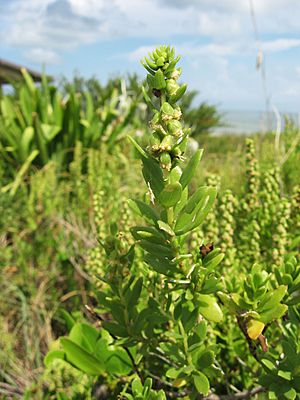Dune marsh-elder facts for kids
Quick facts for kids Dune marsh-elder |
|
|---|---|
 |
|
| Scientific classification | |
| Kingdom: | |
| (unranked): | |
| (unranked): | |
| (unranked): | |
| Order: | |
| Family: | |
| Genus: |
Iva
|
| Species: |
I. imbricata
|
| Binomial name | |
| Iva imbricata Walter 1788
|
|
| Synonyms | |
|
Baillieria caroliniana Spreng. |
|
The Seacoast Marsh Elder (scientific name: Iva imbricata) is a special type of flowering plant. It belongs to the aster family, which includes many common flowers like daisies and sunflowers. This plant is native to North America, specifically found in Cuba, the Bahamas, and along the coast of the United States, from Texas all the way to Virginia.
You can usually find the Seacoast Marsh Elder growing on sandy beaches and sand dunes. It's super tough and can handle a lot of salt, which is why it often grows closest to the ocean compared to other plants.
About the Seacoast Marsh Elder
The Seacoast Marsh Elder is a small shrub that can grow up to about 100 centimeters (or 40 inches) tall. It's a very important plant for keeping sand dunes stable. This means its roots help hold the sand in place, stopping it from blowing away. This is really helpful for protecting coastlines.
How It Grows
This plant is quite easy to grow from cuttings, which are small pieces of the plant that can start new roots. When it flowers, it produces many small flower heads. These flower heads grow in long clusters. Each head has between 2 and 17 small flowers, but they don't have the big, showy "petals" that some flowers do.
 | Sharif Bey |
 | Hale Woodruff |
 | Richmond Barthé |
 | Purvis Young |

